Industrial Hygienist Average Salary in Hawaii 2024
How much money does a person working as Industrial Hygienist make in Hawaii?

LOW
58,900
USD AVERAGE
120,000
USD HIGH
187,000
USD
A person working as Industrial Hygienist in Hawaii typically earns around 120,000 USD. Salaries range from 58,900 USD (lowest) to 187,000 USD (highest).
Salary Variance
This is the average salary including housing, transport, and other benefits. Industrial Hygienist salaries in Hawaii vary drastically based on experience, skills, gender, or location. Below you will find a detailed breakdown based on many different criteria.
Industrial Hygienist Pay Scale and Salaries in Hawaii

Salary Structure and Pay Scale Comparison
111,000 USD or more
98,400 to 111,000 USD
69,800 USD or less
69,800 to 98,400 USD
 58,900 USD |
 112,000 USD |
 187,000 USD |
Median Salary, maximum and minimum salary, minimum wage, starting salary, and the salary range
Salary Range, Minimum Wage, and Starting Salary
Salaries for the position Industrial Hygienist in Hawaii range from 58,900 USD (starting salary) to 187,000 USD (maximum salary). It should be noted that the given figure is not the legally mandated minimum wage; rather, it represents the lowest figure reported in a salary survey that included thousands of participants and professionals from all regions of the country.
Median Salary
With a median salary of 112,000 USD, half of the professionals who work as Industrial Hygienist in Hawaii earn less than this amount, and the other half earn more. The median salary denotes the middle value of salaries. Ideally, you would want to belong to the group earning more than the median salary, located on the right side of the salary distribution graph.
Percentiles and Salary Scale
The median is closely associated with two other values known as the 25th and 75th percentiles. By examining the salary distribution chart, it can be determined that 25% of professionals employed as Industrial Hygienist in Hawaii earn less than 91,600 USD, while 75% earn more. Similarly, the chart shows that 75% earn less than 128,000 USD while 25% earn more.
Pay Scale Structure
To provide a better understanding of expected salaries, we categorized the frequently occurring salaries into different ranges. This approach provides a more precise representation of salary distribution for the job title Industrial Hygienist in Hawaii compared to simply calculating the average. The majority of reported salaries, approximately 65%, fall within the range of 69,800 USD to 98,400 USD. About 20% of salaries are below the 69,800 USD mark, while 10% fall within the range of 98,400 USD to 111,000 USD. Only 5% of individuals have salaries exceeding 111,000 USD.
Salary Comparison by Years of Experience / Industrial Hygienist / Hawaii
How do experience and age affect pay?
| 0 - 2 Years | 69,800 USD | |
| 2 - 5 Years | +29% | 89,700 USD |
| 5 - 10 Years | +38% | 124,000 USD |
| 10 - 15 Years | +24% | 153,000 USD |
| 15 - 20 Years | +7% | 164,000 USD |
| 20+ Years | +7% | 175,000 USD |

The experience level is the most important factor in determining the salary. Naturally, the more years of experience the higher the wage. We broke down salaries by experience level for people working as Industrial Hygienist and this is what we found.
Employees with less than two years of experience earn approximately 69,800 USD.
While someone with an experience level between two and five years is expected to earn 89,700 USD, 29% more than someone with less than two year's experience.
Moving forward, an experience level between five and ten years lands a salary of 124,000 USD, 38% more than someone with two to five years of experience.
Additionally, professionals whose expertise span anywhere between ten and fifteen years get a salary equivalent to 153,000 USD, 24% more than someone with five to ten years of experience.
If the experience level is between fifteen and twenty years, then the expected wage is 164,000 USD, 7% more than someone with ten to fifteen years of experience.
Lastly, employees with more than twenty years of professional experience get a salary of 175,000 USD, 7% more than people with fifteen to twenty years of experience.
Typical Salary Progress for Most Careers
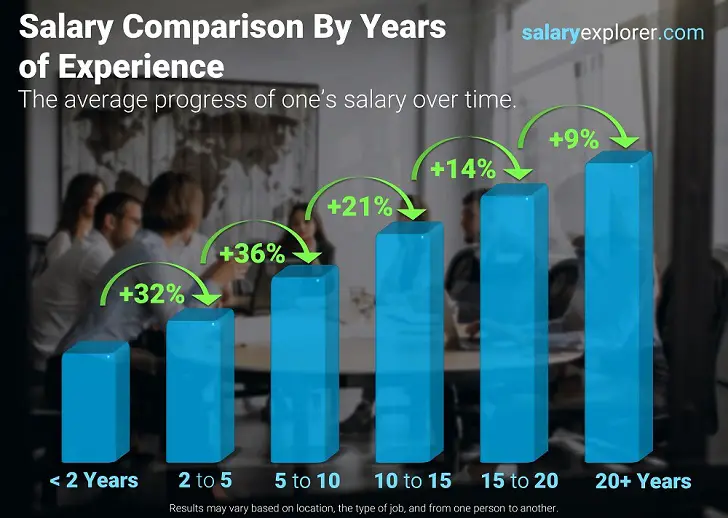
Salary Comparison By Education / Industrial Hygienist / Hawaii
How do education levels affect salaries?
Displayed below is the average salary variance between different education levels of professionals working as Industrial Hygienist.
| Bachelor's Degree | 87,100 USD | |
| Master's Degree | +60% | 140,000 USD |

We all know that higher education equals a bigger salary, but how much more money can a degree add to your income? We broke down salaries by education level for the position Industrial Hygienist in order to make a comparison.
Level 1: Bachelor's Degree
Employees at this education level have an average salary of 87,100 USD.
Level 2: Master's Degree
At this level, the average salary becomes 140,000 USD, 60% more than the previous level.
Is a Master's degree or an MBA worth it? Should you pursue higher education?
A Master's degree program or any post-graduate program in United States costs anywhere from 39,600 USD to 119,000 USD and lasts approximately two years. That is quite an investment.
You can't really expect any salary increases during the study period, assuming you already have a job. In most cases, a salary review is conducted once education is completed and the degree has been attained.
Many people pursue higher education as a tactic to switch to a higher-paying job. The numbers seem to support the theory. The average increase in compensation while changing jobs is approximately 10% more than the customary salary increment.
If you can afford the costs of higher education, the return on investment is definitely worth it. You should be able to recover the costs in roughly a year or so.
Typical Salary Difference by Education for Most Careers

Salary and Compensation Comparison By Gender / Industrial Hygienist / Hawaii

Though gender should not have an effect on pay, in reality, it does. So who gets paid more: men or women? For the people who work as Industrial Hygienist in United States, the average difference between the salary of male and female employees is 6%.
| Male | 122,000 USD | |
| Female | -6% | 115,000 USD |
Salary Comparison By Gender in United States for all Careers

Average Annual Salary Increment Percentage / Industrial Hygienist / Hawaii
How much are annual salary increments in Hawaii for individuals working as Industrial Hygienist? How often do employees get salary raises?
Individuals working as Industrial Hygienist in United States are likely to observe a salary increase of approximately % every months. The national average annual increment for all professions combined is 8% granted to employees every 16 months.
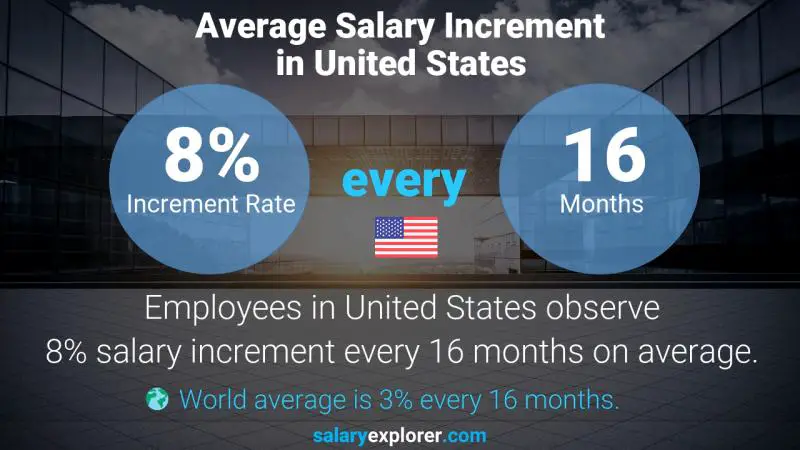
United States / All Professions
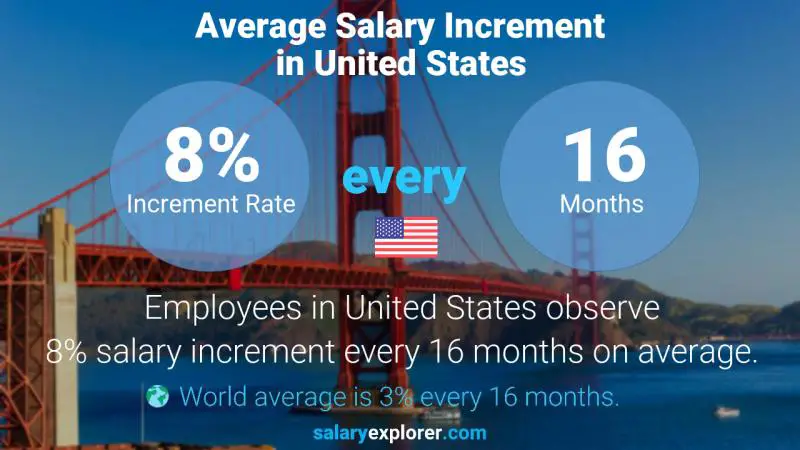
The term Annual Salary Increase usually refers to the increase in 12 calendar month period, but because it is rare that people get their salaries reviewed exactly on the one-year mark, it is more meaningful to know the frequency and the rate at the time of the increase.
How to calculate the salary increment percentage?
The annual salary Increase in a calendar year (12 months) can be easily calculated as follows: Annual Salary Increase = Increase Rate x 12 / Increase Frequency
Worldwide Salary Raises: All Countries and All Jobs
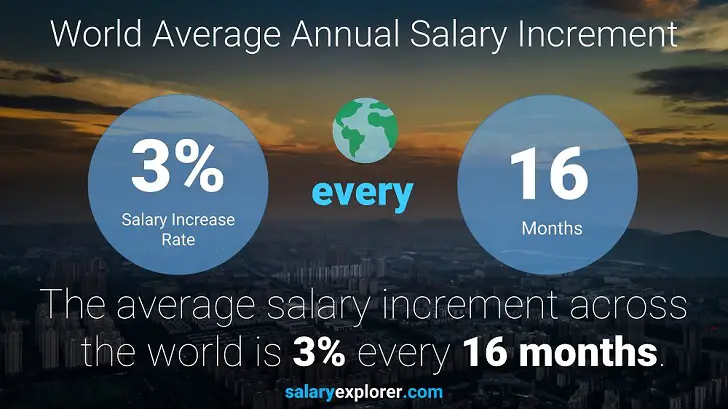
Salary Packages and Schemes
Not all compensation increases are reflected directly in the salary. Some companies offer upgraded packages to their staff instead of cash money. The figures displayed here account only for direct increments to the base salary.
Bonus and Incentive Rates / Industrial Hygienist / United States
How much and how often are bonuses being awarded?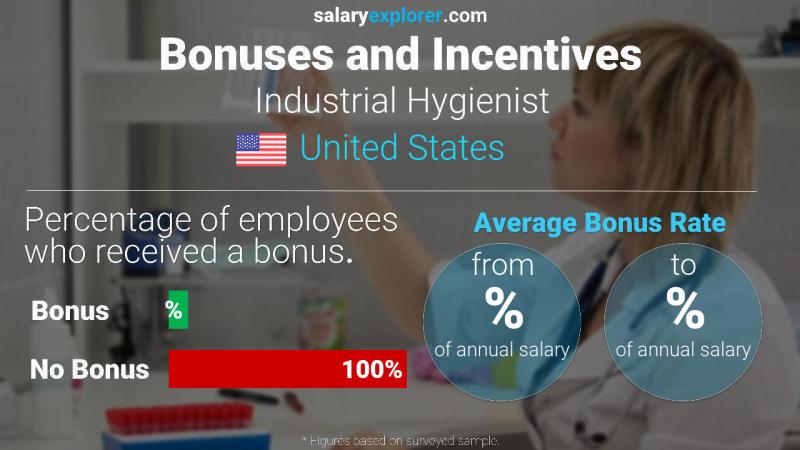 Share This Chart Tweet Get Chart Linkhttp://www.salaryexplorer.com/charts/united-states/health-and-medical/healthcare-technical/industrial-hygienist/annual-salary-bonus-rate-united-states-industrial-hygienist.jpg
Share This Chart Tweet Get Chart Linkhttp://www.salaryexplorer.com/charts/united-states/health-and-medical/healthcare-technical/industrial-hygienist/annual-salary-bonus-rate-united-states-industrial-hygienist.jpg
100% of surveyed staff reported that they haven't received any bonuses or incentives in the previous year while % said that they received at least one form of monetary bonus.
Those who got bonuses reported rates ranging from % to % of their annual salary.
| Received Bonus | % | |
| No Bonus | 100% |
Types of Bonuses Considered
Individual Performance-Based BonusesThe most standard form of bonus, where the employee is awarded based on their exceptional performance.
Company Performance BonusesOccasionally, some companies like to celebrate excess earnings and profits with their staff collectively in the form of bonuses that are granted to everyone. The amount of the bonus will probably be different from person to person depending on their role within the organization.
Goal-Based BonusesGranted upon achieving an important goal or milestone.
Holiday / End of Year BonusesThese types of bonuses are given without a reason and usually resemble an appreciation token.
Bonuses Are Not Commissions!
People tend to confuse bonuses with commissions. A commission is a prefixed rate at which someone gets paid for items sold or deals completed while a bonus is in most cases arbitrary and unplanned.
What makes a position worthy of good bonuses and a high salary?
The main two types of jobs | |
| Revenue Generators | Supporting Cast |
Employees that are directly involved in generating revenue or profit for the organization. Their field of expertise usually matches the type of business. | Employees that support and facilitate the work of revenue generators. Their expertise is usually different from that of the core business operations. |
Example: | Example: |
Revenue generators usually get more and higher bonuses, higher salaries, and more frequent salary increments. The reason is quite simple: it is easier to quantify your value to the company in monetary terms when you participate in revenue generation.
Bonus Comparison by Seniority Level
Top management personnel and senior employees naturally exhibit higher bonus rates and frequencies than juniors. This is very predictable due to the inherent responsibilities of being higher in the hierarchy. People in top positions can easily get double or triple bonus rates than employees down the pyramid.
Average Hourly Wage / Industrial Hygienist / Hawaii
 58 USD per hour
58 USD per hourThe average hourly wage (pay per hour) for individuals working as Industrial Hygienist in Hawaii is 58 USD.This is the rate they get paid for every worked hour.
About The Hourly Pay Rate
The hourly wage is the salary paid in one worked hour. Usually, jobs are classified into two categories: salaried jobs and hourly jobs. Salaried jobs pay a fixed amount regardless of the hours worked. Hourly jobs pay per worked hour. To convert salary into hourly wage the above formula is used (assuming 5 working days in a week and 8 working hours per day which is the standard for most jobs). The hourly wage calculation may differ slightly depending on the worked hours per week and the annual vacation allowance. The figures mentioned above are good approximations and are considered to be the standard. One major difference between salaried employees and hourly paid employees is overtime eligibility. Salaried employees are usually exempt from overtime as opposed to hourly paid staff.
What is the minimum hourly rate of pay?
The minimum pay rate per hour for people working as Industrial Hygienist in Hawaii is 28 USD. This is the minimum as per the gathered data in the salary survey not the minimum hourly rate mandated by law.
Salary comparison with similar jobs
| Job Title | Average Salary |
| Health and Medical |  -100% -100% | |
| Academic Clinician | 170,000 USD |  +42% +42% |
| Admitting Officer | 68,300 USD |  -43% -43% |
| Ambulance Attendant | 72,600 USD |  -40% -40% |
| Ambulance Dispatcher | 67,300 USD |  -44% -44% |
| Ambulance Driver | 60,400 USD |  -50% -50% |
| Ambulance Officer and Paramedic | 76,400 USD |  -36% -36% |
| Ambulatory Services Director | 138,000 USD |  +15% +15% |
| Anatomic Pathology Supervisor | 155,000 USD |  +29% +29% |
| Anesthesia Technician | 97,300 USD |  -19% -19% |
| Anesthesiologist | 279,000 USD |  +130% +130% |
| Anesthesiology Assistant | 99,800 USD |  -17% -17% |
| Artificial Intelligence Healthcare Specialist | 125,000 USD |  +4% +4% |
| Assistant Optometrist | 77,400 USD |  -36% -36% |
| Audiologist | 169,000 USD |  +41% +41% |
| Biohacking Expert | 141,000 USD |  +17% +17% |
| Biomedical Engineering Director | 122,000 USD |  +2% +2% |
| Biomedical Engineering Technician | 62,400 USD |  -48% -48% |
| Cardiac Technician | 65,200 USD |  -46% -46% |
| Cardiovascular Specialist | 364,000 USD |  +200% +200% |
| Cardiovascular Technologist | 135,000 USD |  +12% +12% |
| Central Service Technician | 78,300 USD |  -35% -35% |
| Central Sterile Processing Technician | 73,200 USD |  -39% -39% |
| Certified Clinical Research Coordinator | 80,300 USD |  -33% -33% |
| Certified Respiratory Therapist | 145,000 USD |  +21% +21% |
| Charge Entry Specialist | 81,700 USD |  -32% -32% |
| Clinical Application Specialist | 84,000 USD |  -30% -30% |
| Clinical Biochemist | 159,000 USD |  +32% +32% |
| Clinical Cytogeneticist | 133,000 USD |  +11% +11% |
| Clinical Data Reviewer | 82,100 USD |  -32% -32% |
| Clinical Development Specialist | 100,000 USD |  -17% -17% |
| Clinical Documentation Specialist | 129,000 USD |  +7% +7% |
| Clinical Field Associate | 86,800 USD |  -28% -28% |
| Clinical Genetic Technologist | 134,000 USD |  +12% +12% |
| Clinical Laboratory Technician | 74,700 USD |  -38% -38% |
| Clinical Microbiologist | 171,000 USD |  +42% +42% |
| Clinical Molecular Geneticist | 139,000 USD |  +16% +16% |
| Clinical Neuropsychologist | 190,000 USD |  +58% +58% |
| Clinical Research Coordinator | 94,500 USD |  -21% -21% |
| Clinical Scientist | 185,000 USD |  +54% +54% |
| Clinician | 169,000 USD |  +41% +41% |
| CME Specialist | 145,000 USD |  +21% +21% |
| Contact Tracer | 77,000 USD |  -36% -36% |
| CT Technologist | 86,100 USD |  -28% -28% |
| Cytogenetic Technologist | 126,000 USD |  +5% +5% |
| Diagnostic Medical Sonographer | 98,300 USD |  -18% -18% |
| Dispensing Optician | 77,300 USD |  -36% -36% |
| Dosimetrist | 122,000 USD |  +2% +2% |
| EKG Technician | 83,700 USD |  -30% -30% |
| Endoscopic Assistant | 72,400 USD |  -40% -40% |
| Endoscopy Technician | 72,900 USD |  -39% -39% |
| Enterostomal Therapist | 115,000 USD |  -4% -4% |
| Epidemiologist | 153,000 USD |  +27% +27% |
| FGP Ultrasound Techncian | 72,000 USD |  -40% -40% |
| Geriatric Care Technologist | 120,000 USD |  -0% -0% |
| Health Data Analyst | 85,100 USD |  -29% -29% |
| Health Informatics Specialist | 89,200 USD |  -26% -26% |
| Health Information Exchange Specialist | 98,800 USD |  -18% -18% |
| Health Systems Specialist | 102,000 USD |  -15% -15% |
| Health Technologist | 123,000 USD |  +2% +2% |
| Healthcare Data Analyst | 86,700 USD |  -28% -28% |
| Healthcare Data Scientist | 127,000 USD |  +6% +6% |
| Healthcare Information Technology Specialist | 116,000 USD |  -3% -3% |
| Healthcare Robotics Engineer | 88,200 USD |  -27% -27% |
| Hearing Aid Specialist | 87,800 USD |  -27% -27% |
| Hemodialysis Technician | 90,600 USD |  -25% -25% |
| Histology Technician | 75,900 USD |  -37% -37% |
| Histotechnologist | 113,000 USD |  -6% -6% |
| ICD-10 Coder | 62,000 USD |  -48% -48% |
| Immunologist | 162,000 USD |  +35% +35% |
| Industrial Hygienist | 120,000 USD |  -0% -0% |
| Infection Control Coordinator | 85,800 USD |  -29% -29% |
| Infection Control Practitioner | 183,000 USD |  +52% +52% |
| Infection Preventionist | 129,000 USD |  +7% +7% |
| Informatics Practice Specialist | 101,000 USD |  -16% -16% |
| Interventional Radiographer | 146,000 USD |  +22% +22% |
| Lab Assistant | 70,500 USD |  -41% -41% |
| Laboratory Manager | 129,000 USD |  +7% +7% |
| Laboratory Supervisor | 113,000 USD |  -6% -6% |
| Laboratory Technician | 66,200 USD |  -45% -45% |
| Low Vision Therapist | 151,000 USD |  +26% +26% |
| Mammography Technician | 71,100 USD |  -41% -41% |
| Medical Coder | 61,500 USD |  -49% -49% |
| Medical Courier | 47,000 USD |  -61% -61% |
| Medical Equipment Preparer | 70,900 USD |  -41% -41% |
| Medical Forms Designer | 56,400 USD |  -53% -53% |
| Medical Physicist | 192,000 USD |  +60% +60% |
| Medical Technologist | 77,300 USD |  -36% -36% |
| MRI Technologist | 71,900 USD |  -40% -40% |
| Music Therapist | 98,700 USD |  -18% -18% |
| Neonatologist | 201,000 USD |  +67% +67% |
| Neurodiagnostic Techncian | 73,200 USD |  -39% -39% |
| Neuropsychology Testing Assistant | 67,400 USD |  -44% -44% |
| Nuclear Medical Technician | 97,800 USD |  -19% -19% |
| Nuclear Medicine Technolgoist | 94,900 USD |  -21% -21% |
| Nutrition Assistant | 72,400 USD |  -40% -40% |
| Occupaitional Therapy Assistant | 77,400 USD |  -36% -36% |
| Operating Room Scheduler | 63,300 USD |  -47% -47% |
| Operating Room Services Director | 212,000 USD |  +76% +76% |
| Ophthalmic Assistant | 78,700 USD |  -34% -34% |
| Ophthalmic Laboratory Technician | 77,100 USD |  -36% -36% |
| Ophthalmic Medical Technician | 75,400 USD |  -37% -37% |
| Ophthalmic Technologist | 73,800 USD |  -39% -39% |
| Optician | 165,000 USD |  +37% +37% |
| Orthopedic Technician | 77,400 USD |  -36% -36% |
| Orthoptist | 208,000 USD |  +73% +73% |
| Orthotist | 203,000 USD |  +69% +69% |
| Pathology Assistant | 71,200 USD |  -41% -41% |
| Perfusionist | 223,000 USD |  +86% +86% |
| Phlebotomist | 52,800 USD |  -56% -56% |
| Phlebotomy Technician | 55,200 USD |  -54% -54% |
| Positron Emission Tomography Technologist | 84,100 USD |  -30% -30% |
| Pre Authorization Case Manager | 103,000 USD |  -14% -14% |
| Prosthetist | 175,000 USD |  +46% +46% |
| Radiation Therapist | 243,000 USD |  +100% +100% |
| Radiation Therapy Technologist | 101,000 USD |  -16% -16% |
| Radiographer | 164,000 USD |  +37% +37% |
| Radiography Technologist | 98,500 USD |  -18% -18% |
| Radiologic Technologist | 101,000 USD |  -16% -16% |
| Radiology Technologist | 103,000 USD |  -14% -14% |
| Remote Patient Monitoring Specialist | 93,400 USD |  -22% -22% |
| Respiratory Care Practitioner | 186,000 USD |  +55% +55% |
| Respiratory Therapist | 139,000 USD |  +16% +16% |
| Respiratory Therapy Technician | 80,300 USD |  -33% -33% |
| Robotics Surgical Technician | 104,000 USD |  -13% -13% |
| Sonographer | 103,000 USD |  -14% -14% |
| Sonography Technologist | 98,300 USD |  -18% -18% |
| Speech and Language Pathologist | 146,000 USD |  +22% +22% |
| Telemedicine Specialist | 132,000 USD |  +10% +10% |
| Therapeutics Specialist | 125,000 USD |  +4% +4% |
| Ultrasonographer | 82,700 USD |  -31% -31% |
| Ultrasound Technologist | 80,600 USD |  -33% -33% |
| Vascular Technologist | 69,800 USD |  -42% -42% |
| Virtual / Augmented Reality Medical Training Specialist | 111,000 USD |  -8% -8% |
| X-Ray Technologist | 102,000 USD |  -15% -15% |
Government vs Private Sector Salary Comparison
Where can you get paid more, working in a private company or the government? The difference between the public or government sector salaries and the private sector salaries in United States is 5% on average across all career fields.
| Private Sector | 92,800 USD | |
| Public Sector | +5% | 97,500 USD |
Salary Statistics and Calculation Guide
What is considered to be a good and competitive salary for the job title Industrial Hygienist in Hawaii?
A good and competitive compensation would range anywhere between 112,000 USD and 128,000 USD. This is a very rough estimate. Experience and education play a very huge part in the final earnings.
Gross Salary (before tax) and Net Salary (after tax)
All salary and compensation figures displayed here are gross salary figures, that is the salary before tax deductions. Because taxes may differ across sectors and locations, it is difficult to accurately calculate the net salary after tax for every career.
Base / Basic Salary
The base salary for a careers like Industrial Hygienist in Hawaii ranges from 58,900 USD to 91,600 USD. The base salary depends on many factors including experience and education. It is not easy to provide a figure with very little information, so take this range with a grain of salt.
What is the difference between the median and the average salary?
Both are indicators. If your salary is higher than both the average and the median then you are doing very well. If your salary is lower than both, then many people earn more than you and there is plenty of room for improvement. If your wage is between the average and the median, then things can be a bit complicated. We wrote a guide to explain all about the different scenarios. How to compare your salary




